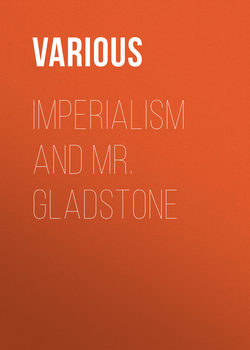Читать книгу Imperialism and Mr. Gladstone - Various - Страница 4
THE QUEEN AS EMPRESS OF INDIA (1876)
ОглавлениеSource.—Hansard, Third Series, vol. 227, col. 1,736 (Debate on Royal Titles Bill, March 9, 1876)
Mr. Gladstone: … In my opinion this is a matter of the greatest importance. We have had some declarations in this House with respect to India. The hon. member for West Cumberland (Mr. Percy Wyndham), on the night when the right hon. gentleman first made his proposal, said that an Imperial title would be the one most suitable, because it would signify that Her Majesty governed India without the restraints of law or constitution.
Mr. Percy Wyndham: I said that the Government of India was a despotic Government, not in the hands of one person, and not, as in this country, a constitutional Government in the hands of the Queen and the Houses of Lords and Commons. The Government of India is essentially a despotic Government as administered by us, although it includes more than one individual.
Mr. Gladstone: I am very much obliged, and I perceive completely the hon. member's meaning; but I am sorry that to that meaning, as it stands, I take the greatest objection. If it be true – and it is true – that we govern India without the restraints of law, except such law as we make ourselves; if it be true that we have not been able to give to India the benefit and blessings of free institutions, I leave it to the hon. gentleman – I leave it to the right hon. gentleman if he thinks fit – to boast that he is about to place that fact solemnly upon record. By the assumption of the title of Empress, I for one will not attempt to turn into glory that which, so far as it is true, I feel to be our weakness and our calamity… It is plain that the government of India – that is, the entire India – never has yet, by statute, been vested in Her Majesty; but that which has been vested is the government of the countries which were held in trust for Her Majesty by the East India Company. I would be the last man to raise this question if it were a mere verbal quibble. It is as far as possible from being a question merely verbal… I am under the belief that to this moment there are important Princes and States in India over which we have never assumed dominion, whatever may have been our superiority of strength. We are now going, by Act of Parliament, to assume that dominion, the possible consequences of which no man can foresee; and when the right hon. gentleman tells us the Princes desire this change to be made, does he really mean to assure us that this is the case? If so, I require distinct evidence of the fact. There are Princes in India who, no doubt, have hitherto enjoyed no more than a theoretical political supremacy, but do they desire to surrender even that under the provisions of this Bill? The right hon. gentleman is going to advise the Queen to become Empress of India. I raise the question, What is India? I have said that the dominion now vested in Her Majesty is limited to the territories vested in the East India Company. I ask whether the supremacy of certain important Native States in India ever was vested in the Company, or whether it was not? We are bound to ask the right hon. gentleman – and I think he is bound to answer the question through the medium of his best legal authorities – whether this supremacy is so vested or not, and whether he can assure us upon his responsibility that no political change in the condition of the Native Princes of India will be effected by this Bill. If there is a political change effected, I do not hesitate to say I do not think it would be possible to offer too determined an opposition to the proposal of the Government… I feel with the right hon. gentleman – indeed, I feel a little more than the right hon. gentleman – the greatness, the unsullied greatness, of the title which is now borne by the Queen of England. I think I use the language of moderation when I say that it is a title unequalled for its dignity and weight, unequalled for the glory of its historic associations, unequalled for the promise which it offers to the future, among the titles of the Sovereigns of Europe, among all the states and nations on earth. Sir, I have a jealousy of touching that title, and I am not to be told that this is a small matter. There is nothing small in a matter, in my judgment, which touches the honour and dignity of the Crown of England… The right hon. gentleman has indeed manfully contended that there is no inferiority in the title of King as compared with that of Emperor… I want to know why I am to be dragged into novelties, or into comparisons on a subject of this sort?.. There is one other point on which I am anxious to make a few comments. I was, I own, struck by what fell from my right hon. friend the member for the University of London (Mr. Lowe) the other evening in reference to the colonies. Whether it be desirable to make any recital with regard to the colonies or not, it is a subject which requires much consideration whether we can wisely introduce reference to India in the title of the Sovereign, while we at the same time take no notice of the colonies.
